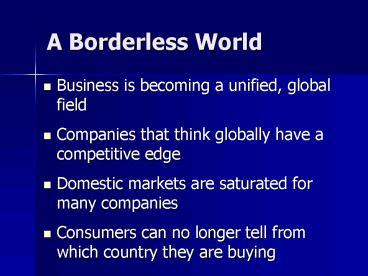A Borderless World - PowerPoint PPT Presentation
1 / 21
Title:
A Borderless World
Description:
Individualism and collectivism (Individualism take care of themselves) ... Societal collectivism. Individual collectivism. Performance orientation. Humane orientation ... – PowerPoint PPT presentation
Number of Views:4344
Avg rating:3.0/5.0
Title: A Borderless World
1
A Borderless World
- Business is becoming a unified, global field
- Companies that think globally have a competitive
edge - Domestic markets are saturated for many companies
- Consumers can no longer tell from which country
they are buying
2
- The Other Side of Outsourcing Video
3
Four Stages of Globalization
- Domestic stage
- market potential is limited to the home country
- production and marketing facilities located at
home - International stage
- exports increase
- company usually adopts a multi-domestic approach
- Multinational stage
- marketing and production facilities located in
many countries - more than 1/3 of its sales outside the home
country - Global (or stateless) stage
- making sales and acquiring resources in whatever
country offers the best opportunities and lowest
cost - ownership, control, and top management tend to
be dispersed
4
Global (stateless) Corporations
- Number is increasing
- Awareness of national borders decreasing
- Rising managers expected to know a 2nd or 3rd
language - Corporate Example Nestle (Swiss)
- CEO Peter BrabeckLetmathe (Austrian)
- Half of general managers (non-Swiss)
- Strong faith in regional managers who are native
to the region
5
International Environment Factors
- Economic
- Economic development
- Infrastructure
- Resource and product markets
- Per capita Income
- Exchange rates
- Economic conditions
- Legal-Political
- Political risk
- Government takeovers
- Tariffs, quotas, taxes
- Terrorism, political instability
- Laws, regulations
Organization
- Sociocultural
- Socio values, beliefs
- Language
- Religion (objects, taboos, holidays)
- Kinship patterns
- Formal education, literary
- Time orientation
6
Economic Environment Factors
- Economic development
- Infrastructure
- Resource and product markets
- Exchange rates
- Inflation
- Interest rates
- Economic growth
7
Economic Development
- Countries categorized as developing or
developed - Criterion used to classify is per capita income
- Developing countries have low per capita incomes
- LDCs located in Asia, Africa, and South America
- Developed are North America, Europe, Japan
- Driving global growth in Asia, Eastern Europe,
Latin America
8
Infrastructure
- A countrys physical facilities that support
economic activities - Airports, highways, and railroads
- Energy-producing facilities
- Communication facilities
9
Resource and Product Markets
- When operating in another country...
- Managers must evaluate market demand
- To develop plants, resource markets must be
available raw materials and labor
10
Exchange Rates
- Rate at which one countrys currency is exchanged
for another countrys - Has become a major concern for companies doing
business internationally - Changes in the exchange rate can have major
implications for profitability of international
operations
11
The Legal-Political Environment
- Political Risk due to events or actions by host
governments - Loss of assets
- Loss of earning power
- Loss of managerial control
- Government takeovers
- Acts of violence
12
Political Instability
- Events such as riots, revolutions, or government
upheavals that affect the operations of an
international company
13
Laws and Regulations
- Government laws and regulations differ from
country to country - Make doing business a true challenge for
international firms - Internet has increased impact of foreign laws on
U.S. companies expands potential for doing
business on global basis
14
Sociocultural Environment
- Culture shared knowledge, beliefs, values,
common modes of behavior, and ways of thinking
among members of a society - Intangible
- Pervasive
- Difficult for outsider to learn
- Managers need to understand difference in social
values to comprehend local cultures and deal with
them effectively
15
Hofstedes Value Dimensions
- Research national value systems influence
organizational and employee working relationships - Power distance (high accept inequality)
- Uncertainty avoidance (uncomfortable with
uncertainty) - Individualism and collectivism (Individualism
take care of themselves) - Masculinity/femininity (preference for
achievement/assertiveness femininity for
relationship) - Long-term/short-term orientation 5th dimension
16
Four Dimensions of National Value
17
GLOBE Value Dimensions
Global Leadership and Organizational Behavior
Effectiveness project
More comprehensive view of cultural similarities
and differences
- Assertiveness
- Future orientation
- Uncertainty avoidance
- Gender differentiation
- Power distance
- Societal collectivism
- Individual collectivism
- Performance orientation
- Humane orientation
18
International Cultural Influences
- Other Cultural Characteristics
- Language
- Religion
- Attitudes
- Social Organization
- Education
- Linguistic pluralism several languages exist
- Ethnocentrism regard own culture superior
19
Strategies for EnteringInternational Markets
High
Greenfield Venture
Acquisition
Joint Venture
Ownership of Foreign Operations
Franchising
Licensing
Exporting
Low
Cost to Enter Foreign Operations
High
Low
20
Multinational Corporations (MNC)
- Receives gt25 total sales revenues from
operations outside parent companys home country - Managed as integrated worldwide business system
- Controlled by single management authority
- Top managers exercise global perspective
21
Managing in a Global Environment
- Managers must be sensitive to cultural subtleties
- Personal challenges culture shock
- Managing Cross-culturally
- Leading
- Decision making
- Motivating
- Controlling
- Managers must be culturally flexible and easily
adapt to new situations































